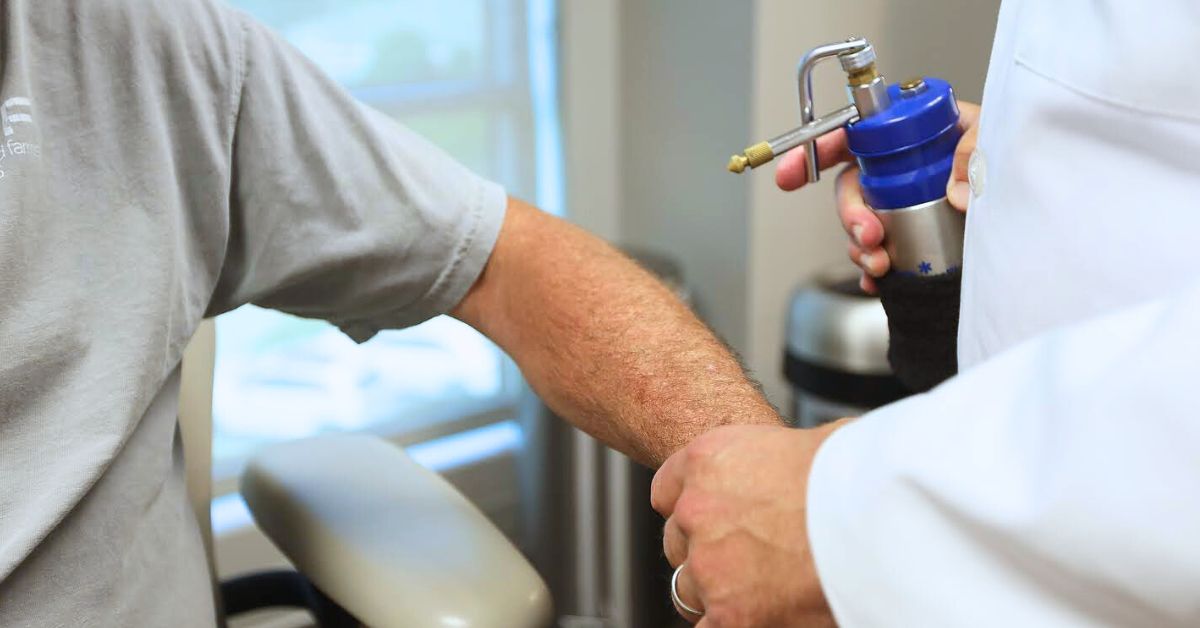Are There Treatments for Skin Cancer Besides Surgery?
Are There Treatments for Skin Cancer Besides Surgery?

Surgical interventions have long dominated the treatment of skin cancer. However, there are also several non-surgical treatments for skin cancer that have developed as the medical world has learned more about this complex condition.
Topical Treatments for Skin Cancer
Also known as chemotherapy cream, topical treatments for skin cancer are applied directly to the lesion. One example of a topical treatment for skin cancer is 5-fluorouracil (5FU), which stops cancer cells from making and repairing DNA.
When to Consider Topical Treatments for Skin Cancer
These types of treatments are ideal for early-stage skin cancers, as well as precancerous lesions that are located superficially on the skin. As a result, these treatments have become an effective solution for superficial basal cell carcinomas and actinic keratoses.
Keep in mind that a topical treatment for your skin cancer may not be right for you if your lesion is large in area or goes deep beneath your skin.
What to Expect from Topical Treatments for Skin Cancer
Patients apply the chemotherapy cream to the lesion as prescribed. Redness, inflammation, and soreness—similar to a sunburn—are common reactions. The duration of the treatment varies, but patients typically notice changes within a few weeks.
Radiation Therapy for Skin Cancer
Radiation therapy damages the DNA within cancer cells by harnessing high-energy particles or waves, such as X-rays. Once this DNA is damaged, the cancer cells are unable to grow and divide.
When to Consider Radiation Therapy for Skin Cancer
Radiation therapy is often used when surgery isn’t an option due to the tumor’s location or health conditions that make surgical intervention risky. It is also used when cancer recurs after surgery.
What to Expect from Radiation Therapy for Skin Cancer
A patient is carefully positioned while the radiation machine—often a linear accelerator—is adjusted to target the cancer site. A custom-made mold or cast might be used to keep you still during the treatment. Although the procedure itself is painless, some patients describe warmth in the treated area, as well as a faint metallic taste in the mouth.
The number of sessions required will vary depending on the cancer type, size, and location. The treatment’s efficacy will be gauged over several sessions, often stretching over a few weeks.
Immunotherapy for Skin Cancer
Immunotherapy is the process of amplifying the body’s natural defense mechanisms against cancer cells. Topical immunotherapies like imiquimod stimulate the immune system to recognize and attack cancerous skin cells.
When to Consider Immunotherapy for Skin Cancer
Immunotherapy is ideal for early-stage skin cancer, especially when a patient would like to preserve maximum skin integrity and avoid surgical scars.
What to Expect from Immunotherapy for Skin Cancer
Patients apply imiquimod cream to the affected area. It may result in inflammation, itching, or even a mild burn as it stimulates the immune cells to target the cancer. The duration of treatment varies based on the cancer’s extent and the body’s response.
Cryotherapy for Skin Cancer
Cryotherapy uses the extreme cold that liquid nitrogen produces to destroy cancerous skin cells. The rapid freezing and slow thawing process work to eliminate the targeted cells.
When to Consider Cryotherapy for Skin Cancer
Cryotherapy works best for small, superficial skin lesions. It’s less invasive than surgery and leaves minimal scarring, making it a preferred choice for lesions on cosmetically sensitive areas.
What to Expect from Cryotherapy for Skin Cancer
Your healthcare professional will apply liquid nitrogen to the lesion using a spray device or a cotton-tipped applicator. As the skin begins to thaw, there is a sharp, cold feeling, as well as a possible stinging or burning sensation.
After the treatment, the frozen lesion forms a scab that falls off within a few weeks. The skin beneath heals and, over time, returns to its natural color, though sometimes a white mark may remain.
Contact Franks Dermatology to Find the Right Skin Cancer Treatment for You
Skin cancer has several complexities that require a comprehensive understanding for effective treatment. Combined with the specific nuances of each patient’s needs, preferences, and medical history, there is no one universally applicable treatment for skin cancer. Fortunately, the experts at Franks Dermatology have the knowledge and experience required to analyze each of these factors and guide you in understanding the risks, benefits, and potential outcomes of each treatment.
If you notice a suspicious lesion or worrying change in your skin, don’t hesitate to call Franks Dermatology at (501) 246-1042. Our team of dedicated experts will perform the appropriate biopsy, obtain an accurate diagnosis, and help you start down the path toward safe, effective healing.
